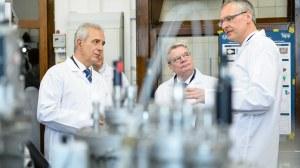
Credit: Bundesregierung/Steffen Kugler
Prof. Karl Leo, director of the Institute of Applied Physics at TU Dresden is a semiconductor physicist at heart. His main interests are novel semiconductor systems such as semiconducting organic thin films, with a special focus on understanding fundamental device principles and their optical response.
He has been fascinated by organic light-emitting diodes (OLEDs) since seeing his first one in 1991. “It was a polymer OLED and it had a lifetime of a few minutes,” Leo says. “To see how it went from those few minutes to products like today’s television screens was a wonderful development.”
After Leo was appointed professor of optoelectronics at TU Dresden in 1993, he began basic research on organic semiconductors. He was convinced there was a technical way to make OLEDs better and perhaps a commercial opportunity if he got it right. And he was right.
Together with his doctoral students Martin Pfeiffer and Jan Blochwitz, he worked on the controlled doping of organic semiconductors. It was a project that initially met with much skepticism among experts. “When we came up with this doping, many colleagues said they didn’t think it would ever work. And that was actually a good motivation, when you’re convinced of something and others tell you it won’t work. Then you want to show them that it does work,” Leo comments.
In 2001, Leo founded the OLED materials supplier Novaled with Pfeiffer and Blochwitz, which was later acquired by Samsung and is considered one of the most successful German start-ups. In the meantime, OLED components created on the drawing board at TU Dresden can be found in almost every cell phone and soon in every television screen around the world.
Leo has been honored for these outstanding achievements with numerous awards, including the Leibniz Prize (2002), the Berlin-Brandenburg Academy Prize (2002), the Manfred von Ardenne Prize (2006), the Future Prize of the German President (2011), the Rudolf Jäckel Prize (2012), the Dr. techn. h.c. of the University of Southern Denmark (2013) and the Technology Transfer Prize of the DPG (2016).
With the Jan Rajchmann Prize, his work now also receives international recognition and gives Saxony worldwide visibility as a competitive location for micro- and nanoelectronics.
About the Jan Rajchmann Prize
The U.S. Society for Information Display (SID) annually awards the Jan Rajchman Prize for outstanding scientific or technical achievement or pioneering research contributions to electronic display technology. Since 1993, the $2,000 prize has been presented by the SID Board of Directors on the recommendation of the Honors and Awards Committee. Prof. Karl Leo is the first German laureate.
###
Media Contact
Prof. Karl Leo
[email protected]




